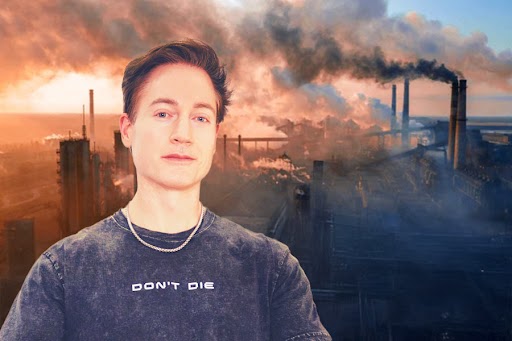Bryan Johnson, an entrepreneur best known for his quest to fight ageing, said he had walked out of a podcast with Zerodha Co-founder Nikhil Kamath because the air quality in the room was abysmal, his post coming hours before a Lancet study said lung cancer was on the rise among non-smokers and air pollution could be the cause.
Johnson had barely settled into his seat for a conversation with Kamath when he made a startling statement:
"I can’t see you over there."
It wasn’t a joke. Despite wearing a N95 mask and bringing along his own air purifier, Johnson found the conditions unbearable. Less than halfway through the recording, he walked out.
Johnson later took to X to explain his decision, revealing that the room was circulating outside air, which made his purifier useless.
The indoor Air Quality Index (AQI) stood at 130, with PM2.5 levels at 75 µg/m³, which was equivalent to smoking 3.4 cigarettes a day.
"This was my third day in India, and the air pollution had already made my skin break out in a rash. My eyes and throat burned," he wrote.
The situation seemed confusing to him.
"Air pollution has been so normalized in India that no one even notices anymore despite the science of its negative effects being well known. People would be outside running. Babies and small children exposed from birth. No one wore a mask which can significantly decrease exposure”, he added.
When he posted his clarification on X, only some agreed with his concerns. Others mocked him.
“Bro, Just Chill”, one X user dismissed his concerns. “Stop measuring the air quality everywhere you go and start enjoying the place.”, the reaction added.
Another user speculated that Johnson’s ultra-controlled lifestyle – he reportedly follows a strict anti-ageing regimen – had made him too fragile: "If three days in India did all that to you but doesn’t affect most people here, maybe your way of living is actually weakening your immune system?"
Some people also found humor in his complaints. "Thank God you didn’t visit Delhi!"
But others took his words seriously. "Leaders will only act when the common people demand it," another X user posted. "If we stay indifferent, nothing will change."
A recent study, published in The Lancet Respiratory Medicine Journal for World Cancer Day (February 4) revealed that adenocarcinoma — a type of lung cancer weakly linked to smoking — now accounts for 53-70 per cent of lung cancer cases in 2022 among never-smokers around the world.
In 2022 alone, more than 80,000 cases worldwide were traced directly to air pollution exposure.
Among the women diagnosed with adenocarcinoma, 80,378 could be traced to ambient particulate matter (PM) pollution in 2022, globally.
Dr. Freddie Bray, the study’s lead author, warned: "Changes in smoking patterns and exposure to air pollution are among the main determinants of the changing risk profile of lung cancer incidence by subtype that we see today”.
The Lancet study also revealed that lung cancer in people who have never smoked is now the fifth leading cause of cancer-related mortality worldwide.
“It occurs almost exclusively as adenocarcinoma and is most commonly found in women and Asian populations," the authors wrote.
As of 2019, nearly everyone on the planet was living in areas that failed to meet the World Health Organization’s air quality standards, according to the study.
India is among the worst-affected.
India’s cities continue to rank among the most polluted in the world. On February 1, 2025, New Delhi recorded an AQI of 312..which is classified as “very poor.” Mumbai wasn’t much better, with an AQI of 205.
Johnson questioned why air quality wasn’t a top priority for India’s leaders.
"The evidence shows that India would improve the health of its population more by cleaning up air quality than by curing all cancers," he wrote. "I don’t know what interests, money, or power keep things the way they are, but it’s really bad for the entire country."











